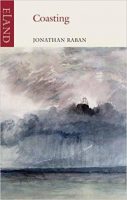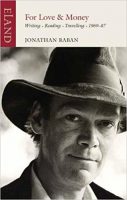 “Which is your favourite travel book?” I’m often asked. I read a lot of them, for review and pleasure, so I’m adding to my favourites every year. But there are a few I re-read regularly. One of those is Coasting, one of five titles by Jonathan Raban that is being reissued by Eland Books, that great reviver of the out-of-print in travel classics.
“Which is your favourite travel book?” I’m often asked. I read a lot of them, for review and pleasure, so I’m adding to my favourites every year. But there are a few I re-read regularly. One of those is Coasting, one of five titles by Jonathan Raban that is being reissued by Eland Books, that great reviver of the out-of-print in travel classics.
Raban has written three novels as well as nine-or-so works of non-fiction; he’s a writer who travels rather than a traveller who writes. “The writer’s working conditions,” he has said, “tend to drive him to travel, just as they often drive him to drink.” Coasting demonstrates that you don’t have to be driven far to write a great book: he approaches home as if he’s not an Englishman but a foreigner, sailing into Britain in the year of the Falklands War (1982) in his 30-foot ketch:
Even when you’ve spent just a few hours at sea, it is always a bit difficult to learn to walk on land. After water, earth is a sickmakingly unstable element… At first I took the news of the war as another symptom of this general topsy-turviness of things on land. I didn’t trust it, any more than I trusted the scaly cobbles of the fish market or its green filigree roof, which was swaying dangerously overhead. It seemed beyond belief.
Coasting is a portrait of home that’s both fond and wickedly funny (and, weirdly, bang on the Brexit button: “England, seen from the sea, looks so withdrawn, preoccupied and inward… its fringe of garden posted against trespassers.”). It demonstrates powerfully, too, the freedom of the form — assuming there’s a form at all, for travel writing licenses you to write about pretty well anything. The travel writer should be no more constrained by supposed boundaries between genres than an otter is on the River Liddel by a mapmaker’s line dividing England from Scotland.
Raban, in Coasting, exploits the possibilities to the full. He was inspired by Laurence Sterne’s A Sentimental Journey (1768), a book Sterne wrote partly to poke fun at a contemporary, Tobias Smollett, and his plodding, linear account of a journey through France and Italy. Raban’s plan was that his book “would be part meditation, part autobiography, part adventure story, and it would, with luck and grace, have the improvised, imaginative structure of a work of fiction, rather than the Gradgrindish, topographical progression from A to B of the conventional travel book.” He succeeded brilliantly.
“Watching water move,” he writes in Coasting, “is a much sweeeter and less unpredictable way of altering the mind than inhaling the smoke of marijuana.” Reading Raban as he reads water can be similarly effective in opening doors to perception:
The Irish Sea is, as Seas go, small, shallow and parochial. It responds, as parochial places do, to any news or change with the rapidity of a village. When a gale blows up, the Irish Sea turns instantly to whipped cream; when the wind dies, it goes flat in an hour.
He is equally good on rivers:
In the last few days I had noticed that every time I stopped at a town it was like going to a movie. One watched and listened, and knew that what one was seeing and hearing wasn’t for real. Actual life was the river itself. It was the roll of a wake lifting the boat and slamming it down. It was the monotonous stutter of the motor at my back, the buoys, mile-markers, sandbars and the trick the river had of always fading, miles ahead, into the sky, so that one had the illusion of being able to drift right off the surface of the earth into pure emptiness. The river had, quite literally, put me into a trance.
 That passage is from Old Glory, another of the books that Eland is reissuing, in which Raban tells of his journey in a 16-foot boat down the Mississippi. The other titles are Arabia, a portrait of the Gulf states prompted by curiosity about the home lives of Arabs he’d seen holidaying in London in the 1970s; Hunting Mister Heartbreak, in which he sets out to discover America and the immigrant experience anew; and For Love & Money, which is about making a living from words. All of them were already on my shelves, and all repay re-reading, but the last — which I bought in Picador paperback in 1988 (can it really be 30 years ago?) — is one of the most well-thumbed.
That passage is from Old Glory, another of the books that Eland is reissuing, in which Raban tells of his journey in a 16-foot boat down the Mississippi. The other titles are Arabia, a portrait of the Gulf states prompted by curiosity about the home lives of Arabs he’d seen holidaying in London in the 1970s; Hunting Mister Heartbreak, in which he sets out to discover America and the immigrant experience anew; and For Love & Money, which is about making a living from words. All of them were already on my shelves, and all repay re-reading, but the last — which I bought in Picador paperback in 1988 (can it really be 30 years ago?) — is one of the most well-thumbed.
Raban was born in 1942 and taught English and American literature at university before turning to writing. Younger readers coming to his work for the first time thanks to Eland — especially those struggling to pay rent — will be envious to learn just how little he could get by on in London when starting out. In 1969, he recalls, “For £7 a week (or about 300 words) I rented a large and comfortable room in a flat in Highgate and set up in business as a professional writer.” Younger writers (and quite a few older ones) will marvel at an age in which a critic could afford to read a book twice before pronouncing on it.
If his finances now seem like the stuff of fantasy, his teach-ins on his chosen trade need no updating. Here he is on the difference between the journey and the story, and the process of unearthing the second from the first:
Memory, not the notebook, holds the key. I try to keep a notebook when I’m on the move (largely because writing in it makes one feel that one’s at work, despite all appearances to the contrary) but hardly ever find anything in the notebook that’s worth using later… The keeper of the notebook sounds stupid and confused. He grouses too much about tides and timetables, and all the forgettable mechanics of the journey; he fails to notice what I remember in near-photographic detail…
Memory, though, is always telling stories to itself, filing experience in narrative form. It feeds irrelevancies to the shredder, enlarges on crucial details, makes links and patterns, finds symbols, constructs plots. In memory, the journey takes shape and grows; in the notebook it merely languishes, with the notes themselves like a pile of cigarette butts confronted the morning after a party.
Raban has long been resident in Seattle, where I was lucky enough to spend some time with him in 2008. He had a stroke in 2011, precipitating a five-year term of writer’s block, from which he is now recovering*. While we wait for his next new work, the Eland reissue is a reminder of the endless pleasures awaiting in his back catalogue.

Leave a Reply